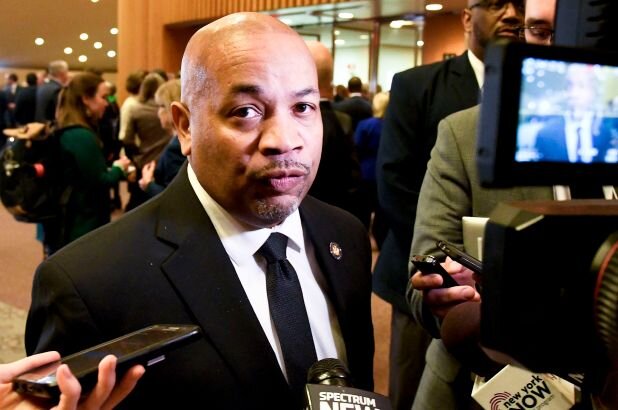Upstate scholars critique New York's cash bail reform law By Luke Perry
New York’s cash bail reform law has generated controversy since being enacted last month, raising questions about implementation.
Senate Democrats recently announced they are willing to offer a compromise to modify the law, proposing to abolish bail completely, “while increasing the types of crimes for which a suspect can be held and increasing judges’ authority to do so.”
Detention would be contingent on the nature of the crime in question, criminal history of the defendant, and potential flight risk. Judges would make this determination based on relevant guidelines.
Senate Major Leader Andrea Stewart-Cousins (D-Yonkers) believes such an approach would still leave New York with the “most progressive” cash bail reform law in the country.
Senate Majority Leader Andrea-Stewart Cousins (Hans Pennink/AP)
Several Assembly members vocally opposed the proposal. “Right now we have a racist institutionalized system that for centuries has done everything possible go after black and brown communities,” said Assemblyman Michael Black (D-Bronx). “We are not going back on bail.”
Assembly Speaker Carl Heastie (D-Bronx) said it was “too early” to consider changes, citing an absence of data, given how new the law is.
Tara Ross, Professor of History at Onondaga Community College, told Ivory Tower on WCNY the law is “working really well.” Police and prosecutors generally did not like this law before it was passed, which she believes informs current concerns, more than substantial evidence. Ross also believes that most people overlook that the law applies to individuals accused of misdemeanors and non-violent felonies.
Prior to the law, 60 percent of New Yorkers in jail were being held pretrial, primarily because they could not afford bail. This has declined, while “judges still have the authority in all cases to impose conditions like oversight by a case manager, referrals to treatment or counseling, and in some cases, electronic monitoring.”
Speaker Carl Heastie (Hans Pennink/AP)
Lisa Dolak, Professor of Law at Syracuse University, is concerned with how the law removes discretion judges had “to hear arguments about so called dangerousness.”
Dolak recognizes this notion was directly related to prejudicial rulings against people of color, “but as a lawyer I’m troubled you can’t make an argument to a judge and a judge can’t make a decision.”
Robert Spitzer, Distinguished Professor of Government at SUNY Cortland, echoed this concern about limiting judicial discretion. Spitzer believes judges should have some discretion to determine if someone accused of a crime is a “risk to society” or a “flight risk.”
Photo by Democrat & Chronicle
Tim Byrnes, Professor of Government at Colgate University, believes the purpose of bail has been distorted and “turned into this idea that some people can buy themselves out of pretrial detention and others cannot.” Bail was intended for people to show up to their trial.
Byrnes said people can debate “who belongs in jail and who doesn’t in a pretrial circumstance,” but “that is separate and apart from the issue of whether you have to pay to get out of jail.”
A dangerousness clause was negotiated out of the New York law, while other states who have eliminated cash bail, such as New Jersey and California, allow pretrial detention of defendants if they are deemed a safety risk.
This looks to be a key focus moving forward.
Luke Perry (@PolSciLukePerry) is Professor of Government at Utica College
Watch Ivory Tower on WCNY (Friday nights at 8pm) for weekly analysis of current issues by local experts in politics, law, history and journalism









